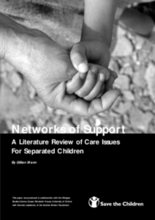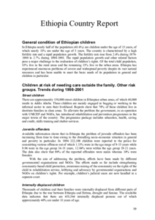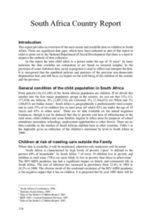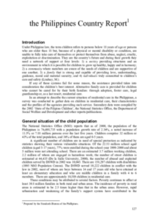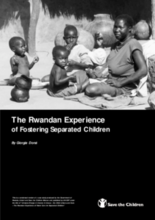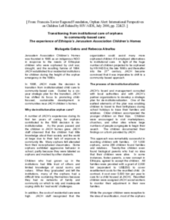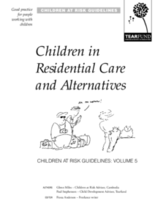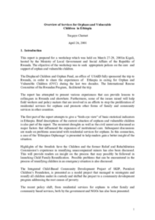Demographic Data
|
Sources: World Bank, UNICEF, UNDP HDR 2015, DHS 2013 |
Displaying 14281 - 14290 of 14551
This report reviews existing the literature on separated children and examines childhood, family, childcare practices and separation. It highlights the importance of context and child participation in designing programs and policies to assist separated children.
Country report of Vietnam on the situation of children in residential care in anticipation of the Second International Conference on Children and Residential Care: New Strategies for a New Millennium, to be held in Stockholm 12 – 15 May 2003.
Country report of Ethiopia on the situation of children in residential care in anticipation of the Second International Conference on Children and Residential Care: New Strategies for a New Millennium, to be held in Stockholm 12 – 15 May 2003.
Country report of South Africa on the situation of children in residential care in anticipation of the Second International Conference on Children and Residential Care: New Strategies for a New Millennium, to be held in Stockholm 12 – 15 May 2003.
Country report of the Philippines on the situation of children in residential care in anticipation of the Second International Conference on Children and Residential Care: New Strategies for a New Millennium, to be held in Stockholm 12 – 15 May 2003.
A report about a case-study in Rwanda documenting the practice of, and policies regarding, fostering (formal and informal). The study also explored the views of children in foster care, caretakers, agencies and local authorities regarding fostering.
An account of Jerusalem Association Children’s Homes’ work involving deinstitutionalization of orphaned children in Ethiopia. The report is a summary of the steps taken by this organization to reunify/reintegrate the children into their families and society and some next steps are also mentioned.
A paper describing a program developed by the IRC in Rwanda for orphans and vulnerable children and youth with a particular focus on minimizing placement of children into centers and finding durable solutions for those already in institutions. The paper discusses IRC’s strategies, and the different components of the program, evaluates the program in the context of Rwanda and offers recommendations to those interested in emulating IRC’s Rwanda program.
A series that provides a framework for good practice and guidelines for those who work in the area of child development policy. The series delves particularly into residential care and other alternatives of care and makes suggestions for reform by evaluating 6 case studies of good practice examples.
A report on a workshop that was presented in Rwanda that sought to share the experiences of of Ethiopia in caring for orphan and vulnerable children. The aim was to provide lessons to colleagues in Rwanda and elsewhere. The report includes statistical data, information on reunification programs, and reviews recent government and NGO policy shifts.

